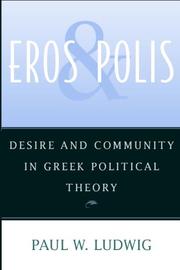| Listing 1 - 1 of 1 |
Sort by
|

ISBN: 0521810655 9780521810654 0511064284 9780511064289 0511072740 9780511072741 0511057954 9780511057953 9780511497773 0511497776 9780521031431 0521031435 110713241X 1280418451 0511330324 1139147722 0511177909 Year: 2002 Publisher: Cambridge, UK : New York : Cambridge University Press,
Abstract | Keywords | Export | Availability | Bookmark
 Loading...
Loading...Choose an application
- Reference Manager
- EndNote
- RefWorks (Direct export to RefWorks)
Eros and Polis examines how and why Greek theorists treated political passions as erotic. Because of the tiny size of ancient Greek cities, contemporary theory and ideology could conceive of entire communities based on desire. A recurrent aspiration was to transform the polity into one great household that would bind the citizens together through ties of mutual affection. In this study, Paul Ludwig evaluates sexuality, love and civic friendship as sources of political attachment and as bonds of political association. Studying the ancient view of eros recovers a way of looking at political phenomena that provides a bridge, missing in modern thought, between the private and public spheres, between erotic love and civic commitment. Ludwig's study thus has important implications for the theoretical foundations of community.
Eros (Greek deity). --- Homosexuality --- Political science --- Sex --- Political aspects --- History. --- Science politique --- Homosexualité --- Sexualité --- Eros (Divinité grecque) --- Histoire --- Aspect politique --- Eros --- Gender (Sex) --- Human beings --- Human sexuality --- Sex (Gender) --- Sexual behavior --- Sexual practices --- Sexuality --- Sexology --- Same-sex attraction --- Sexual orientation --- Bisexuality --- Eρως --- Phanes --- Erot --- Эрот --- Ерос --- Eroso --- Earós --- 에로스 --- Erosŭ --- ארוס --- Эрос --- Erots --- Erotas --- Erósz --- エロース --- Erosi --- 厄洛斯 --- Eluosi --- Cupid --- Eros (Greek deity) --- Arts and Humanities --- History
| Listing 1 - 1 of 1 |
Sort by
|

 Search
Search Feedback
Feedback About UniCat
About UniCat  Help
Help News
News